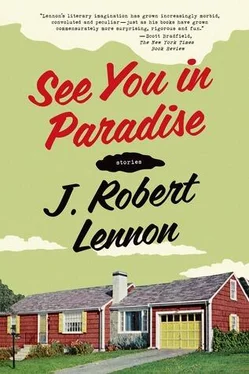Her initial response to the crocus affront was to hand-deliver to Ellen, gaily wrapped with a big red bow, a freshly printed copy of Self Esteem Through Self Love. As Ellen tore away the heavy paper, Julia saw how cruel the gesture was, and she had to restrain herself from grabbing the gift from Ellen’s hands. But Ellen’s reaction was curious: a quickening of breath, a biting of the lip. A slow fanning of the pages. She raised her face to Julia’s (Ellen is so much taller, but it didn’t seem that way at the time) and said, “I’d invite you in for a drink, but I’d like to be alone now.” And the door swung shut.
She was beginning to sort of like this Ellen.
Of course they had to come in contact; Ryan sometimes had to be fetched. And so Ellen and Julia have become friends, after a fashion. They sit in one kitchen or another and have chats. Ellen doesn’t offer anything to eat or drink, she simply sits down and begins talking. Julia wouldn’t call her self-absorbed; in fact, she rarely says anything about herself at all. Instead she pours out whatever’s occurred to her that day or hour in the form of rants. She asks herself pointed questions and answers them. Julia’s role is to nod or say “Of course you’re right” or frown or laugh in order to keep her going, like one of those people who stand on the sidelines of a marathon and hand the runners little cups of water. In the wake of these chats Julia likes to listen to the silence, the myriad sounds that comprise it. Sometimes she thinks of her MFA thesis defense. To every question the committee asked her, she responded by holding up a small landscape she’d done, with blue sky and a cloud and a hill and a farm. She never spoke. They awarded her the degree with less than five minutes of debate.
It is now Friday afternoon. Ray is due home any minute. Of course they’ll go to the party together; to do otherwise would be to betray her sort-of-friend. She is dressed in black: black jeans and a sweater. Her hair is tied back and she wears no jewelry, except for her wedding ring. She designed the rings herself, silver bands engraved with creeping roses. They had a reclusive silversmith from out of town execute the designs. They were married in a fire tower in the NYTech Experimental Forest, among the genetically altered pines. Only about ten people could get up there at once, and Ellen was one of them. Yes, she was stunning: even in her hiking boots, she had the cold beauty of a metaphor, a Lady Liberty stamped on a coin. Ryan wore a tux and seemed very afraid, though of heights or his father’s remarriage, there was no telling.
When something stands between Julia and Ray, it is usually Ryan. It isn’t that she’s jealous of the boy; on the contrary, she loves him. It is the way Ray treats him that hurts her, his sickening attunement to Ryan’s every eccentricity, no matter how slight. It is Ray’s antipathy for the half of Ryan that is Ellen’s: his lurching forehead-first walk; his pencil-gnawing and scab-picking; his tendency to say things, lots of things, in some weird concocted foreign accent. These things are not Ryan’s fault, and what’s wrong with them, anyway? She herself had a few bad habits when she was a kid. She smoked. She pulled long strips of skin off her lips and dried them in the pencil trough of her desk. She masturbated during social studies: and look how lucrative that turned out to be!
The other night Ryan came to their door. It was nearly midnight. He rang the bell and turned his waxy divot of a face toward their bedroom window.
“I’ll go let him in,” Julia said.
“Please, no,” said Ray from the bed.
“No?”
He buried his face in the pillow. They still smelled of each other, from sex. “Please. It’s Ellen’s night tonight. He should be at home.”
At home, she thought. The sting made her say, “You are a cold-hearted man, Ray.”
“Please don’t give me that. He’s seven years old. He can’t treat our house like a room down the hall. I know how it sounds, but trust me.”
She wondered if he really knew how it sounded, how completely awful. She stood watching until Ryan was gone. She watched him pick up a soft drink cup that had been tossed in the yard and stuff it into the trash can at the end of the driveway. After that he went home. He didn’t seem broken up about the snub.
She went to the bed. Ray was on his back again. She reached down and feigned grabbing at his crotch. Then she made a fist and pressed it to her own.
“What the hell was that?” he said.
“I took the sex back.”
He laughed, though he wasn’t supposed to.
Now she can see Ray approaching, walking back from the college. He is too far away to hear, but she can tell by the set of his shoulders, the tilt of his head, that he is whistling. When he passes Ellen’s place, he bows his head a little and jams his hands into his pockets. That’s Ray’s problem: he is terrified of his ex-wife. A sudden rush of affection threatens to topple the tower of chilly detachment she has so carefully erected. He mounts the front steps and shouts her name, and she goes down to greet him.
“I saw you whistling. What was the tune?”
He frowns at being reconnoitered. “I’m surprised you couldn’t tell by sight,” he mutters.
She sits at the kitchen table arranging toast crumbs into floral patterns while he leans against the sink eating an apple. He is forty and she wishes he had a little gray. She likes gray, she likes the idea of his being an older man. But he neither looks nor acts like the older man he is. When he’s finished eating he makes a loop of his arm and she hooks hers through it. He kisses her forehead. The tower crumbles. They walk to the party, already late.
Through Ellen’s windows, the town’s activists can be seen affecting solemnity, their caftans and rimless spectacles and gaunt, squirrellike bodies moving through the emptied front room. Here is Lydia Speyer, who lies down in front of idling bulldozers. There is Paul Waller, architect of the local scrip, earned in local health food stores and restaurants and redeemable at same. Julia knows these people from the paper. She drags Ray through the open door and into the shaggy crowd. They are all here, the editor of the anarchist newspaper, the brewer of medieval beers, the used bookstore owner, the wan naturopath. Where is Ellen? Nowhere to be seen. A low table in the center of the room is covered with a white cloth but not with food. The food and drink are on a wheeled cart parked against a wall. There is something ominous about the empty cloth, she can’t put her finger on it. Her throat begins to itch: dogstink. She fortifies herself and Ray from the cart and endures the overtures of the alternative dentist, then excuses herself and sneaks out the kitchen door to the backyard.
The children are here, hard at play. They seem to be running around randomly, waving brightly colored objects and hollering nonsense words. From time to time one of them collapses in gales of laughter. She is surprised and unsettled by the realization that they are being ironic, “playing in the yard.” She stops one of them — it is Ryan’s companion, Philip — and watches his smile deflate as he removes himself from the game.
“Where’s Ryan?”
Philip points to the back of the property: the doghouse. He hoists a plastic replica of the Empire State Building in the air and leaps back into the fray.
The yard is full of halfhearted holes and uninflated kickballs. Weed-tufts sprout everywhere, and maple saplings form a ragged border. The doghouse is surrounded by bare dirt, the grass having succumbed to Bounder’s years of puttering. She bends over and peers inside, but the house appears to be empty.
“Ryan?”
“Hi.”
Ah. There he is: a gray blob in the darkness, crouched against the far wall. She sticks her head in farther. Her eyes adjust, and she can see he is playing solitaire, the cards splayed before him on the ground. Wedged into a far corner is a shredded plush toy and a pocked rubber ball.
Читать дальше












